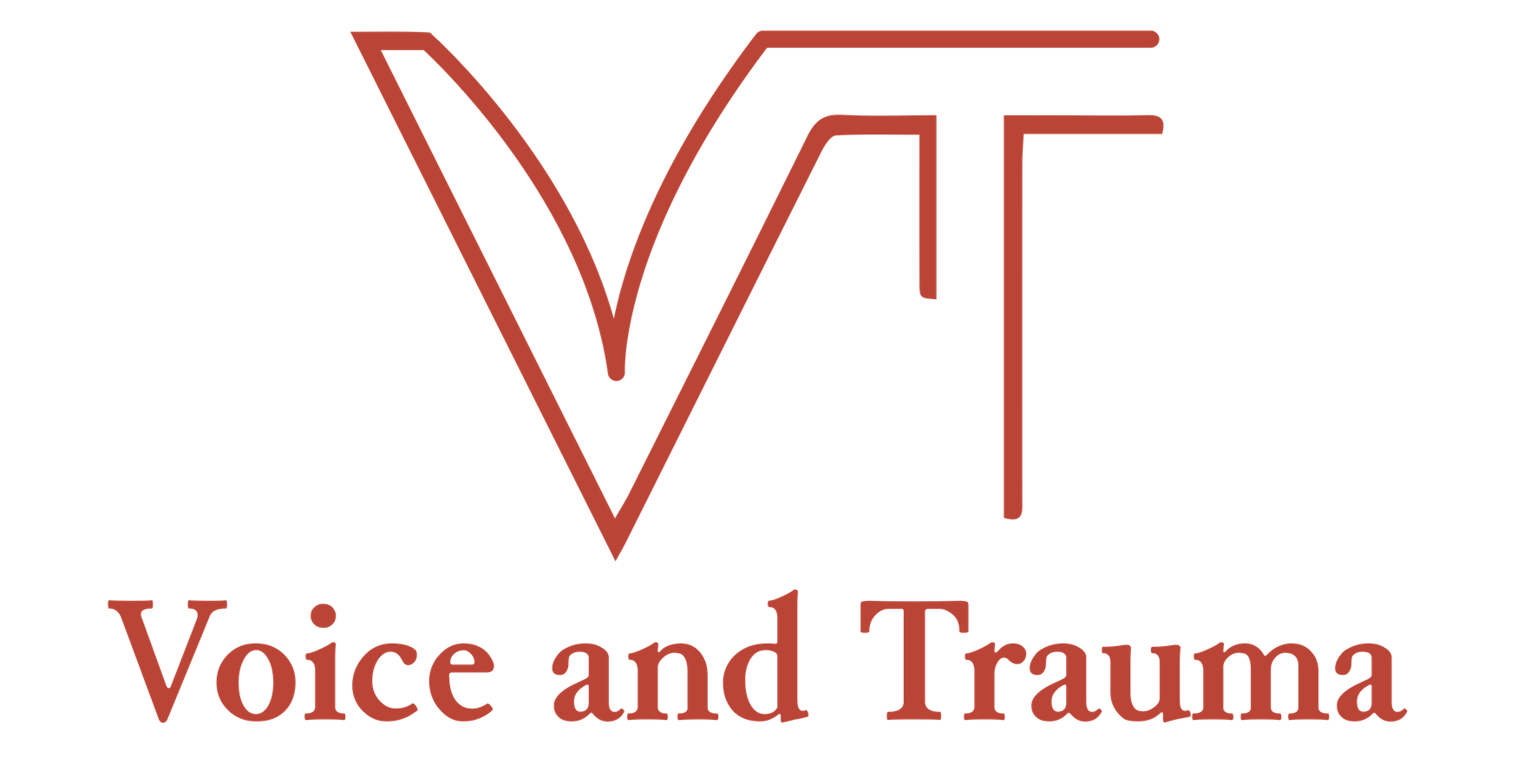Background, Research, and Resources
The literature on voice and trauma is scarce. For the most part there are case studies in voice medicine and music therapy indicating that the voice seems to respond to one’s trauma history.
Experimentally, the trauma-voice relationship needs to be further researched. This is why we need to take into account what we know from:
Voice and stress literature
Voice and emotion
Trauma and psychophysiology
Functional Voice Disorders
PTSD and computational models
voice and trauma in context:
1. We know that the vocal apparatus reacts under stress (manifesting both acoustically and physiologically) but limited research truly addresses how it reacts as a result of trauma (e.g. interpersonal violence).
2. We know from the literature on trauma and psychophysiology that traumatized individuals have strong physiological reactions to reminders of their experiences, but can also present baseline physiological and structural differences (e.g. brain structure).
3. We know that some patients have lost their voices as a result of a traumatic experience with no biological factor that could justify their vocal impairment.
4. Evidence in regards to voice and PTSD in Veterans (Marmar et al, 2019) and childhood trauma and voice perturbation measures (Monti et al., 2021). Also, exploratory evidence links vocal intensity in singers with childhood neglect and insecure attachment (Monti et al., 2017)
These elements suggest that trauma can indeed relate to and have an effect on voice. This is why collecting evidence on the trauma-voice relationship can have important implications.
If one’s trauma history can have an impact on voice, this can affect not only voice function and health, but also elements in communication that relate to social dynamics and one’s quality of life.
Contributing Fields
Some resources:
Can perpetrators discern survivors from voice?
Elisa Monti, Wendy D’Andrea, Linda M. Carroll, Katherine Norton, Noga Miron, Olivia Resto, Kayla Toscano, John Williams, David Harris, Laurel Irene and Anne Maass
Heleen Grooten-Bresser, Keri J. Heilman, Piet G. C. Kooijman, Elisa Monti, Mickey N. Chenault, Logan G. Holmes, Olivia Resto
Emily Jawoski Koriath
Social Determinants of Health: Implications for Voice Disorders and Their Treatment
Geneva V. Mayne and Mahchid Namazi
Self-Reported Stress, Trauma, and Prevalence of Laryngoresponders in the General Population
Leah B. Helou, Brett Welch, Sarah Hoch and Jackie Gartner-Schmidt
Singing in Co-Harmony: An Introduction to Trauma Informed Voice Care
Megan Durham
The Effects Of Childhood Sexual Abuse On Singers
Lauren McQuistin
Diana Rose Becker, Brett Welch, Elisa Monti, Harmony Sullivan, Leah B. Helou
Elisa Monti, Wendy D’Andrea, Steven Freed, David C. Kidd, Shelley Feuer, Linda M. Carroll & Emanuele Castano
Anna C. Rupert and Diane E. Bartlett
Speech-based Markers for Posttraumatic Stress Disorder in US Veterans
Charles R. Marmar Adam D. Brown Meng Qian Eugene Laska Carole Siegel Meng Li Duna Abu‐Amara Andreas Tsiartas Colleen Richey Jennifer Smith Bruce Knoth Dimitra Vergyri
Psychology of Voice Disorders, 2nd Edition
Deborah Caputo Rosen, Johnathan Brandon Sataloff, Robert T. Sataloff
(“Trauma in Voice” chapter by Elisa Monti in above edition)
What’s in a Singer’s Voice: The Effect of Attachment, Emotions and Trauma
Elisa Monti, David C. Kidd, Linda M. Carroll &Emanuele Castano
Anna C. Rupert and Diane E. Bartlett
Janet Baker, Caroline Barnett, Lesley Cavalli, Maria Dietrich, Lorna Dixon, Joseph R Duffy, Annie Elias, Diane E Fraser, Jennifer L Freeburn, Catherine Gregory, Kirsty McKenzie, Nick Miller, Jo Patterson, Carole Roth, Nelson Roy, Jennifer Short, Rene Utianski, Miriam van Mersbergen, Anne Vertigan, Alan Carson,Jon Stone, Laura McWhirter
Na’ama Yehuda
Posttraumatic Stress Disorder and the Nature of Trauma
Bessel van der Kolk
Investigating Voice Quality as a Speaker-Independent Indicator of Depression and PTSD
Stefan Scherer, Giota Stratou, Jonathan Gratch, Louis-Philippe Morency
Psychosocial Perspectives on the Management of Voice Disorders
Janet Baker
Can Childhood Trauma Impact the Adult Voice Through the Brain?
Elisa Monti, Diana Van Lancker Sidtis
The Theory and Practice of Vocal Psychotherapy: Songs of the Self
Diane Austin
Diane Austin
Voice as Embodied Sense: Rethinking Voice and Language in Trauma Healing
Melinda Nettifee
Paul J. Moses
The Psychology of Voice and the Founding of the Roy Hart Theatre
Paul Newham
Stephen W. Porges and Deb A. Dana
Janet Baker et al.
What are we missing? Let us know your thoughts here!

